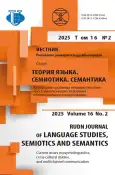Деривационные процессы в речи ребенка от 5 до 6 лет: узуальное и окказиональное
- Авторы: Елисеева М.Б.1
-
Учреждения:
- Российский государственный педагогический университет им. А.И. Герцена
- Выпуск: Том 16, № 2 (2025): Актуальные проблемы психолингвистики, кросс-культурных исследований и поликанальной коммуникации
- Страницы: 392-410
- Раздел: ПСИХОЛИНГВИСТИКА
- URL: https://journal-vniispk.ru/2313-2299/article/view/323519
- DOI: https://doi.org/10.22363/2313-2299-2025-16-2-392-410
- EDN: https://elibrary.ru/HWSLHN
- ID: 323519
Цитировать
Полный текст
Аннотация
Объектом исследования стали особенности словообразования в речи одного ребенка в возрасте от 5 до 6 лет, предмет анализа - словообразовательные окказионализмы и употребление в речи дериватов, относящихся к разным частям речи. Проведено сопоставление словообразовательных окказионализмов рассматриваемого периода с окказионализмами предыдущих этапов (условно отдельным этапом считается каждый год жизни ребенка). Наибольшее количество окказиональных слов отмечено в возрасте от 3 до 4 лет, а наименьшее - от 5 до 6. Преобладающим способом словообразования на всех возрастных этапах является суффиксация. На втором месте все другие способы прямой деривации, при этом доля сложения всегда низка. Обратное и заменительное словообразование встречаются крайне редко. До 3 лет детские инновации относятся к трем частям речи: больше всего существительных, на втором месте - прилагательные, на третьем - глаголы. От 3 до 4 количество существительных и глаголов практически одинаково, а прилагательных меньше. От 4 до 5 процент существительных высок, а глаголов значительно меньше. Доля прилагательных в эти три периода не меняется. От 5 до 6 начинают преобладать глаголы, образованные различными способами, - этот этап можно назвать взрывом глагольного словообразования. Мотивирующими словами для создания детских окказионализмов до 3 лет являются существительные и глаголы, но первых вдвое больше. Затем возникает баланс этих частей речи и появляются прилагательные. Постепенно доля глаголов становится несколько выше по сравнению с существительными, а доля прилагательных увеличивается. Хотя создание инноваций - одно из проявлений метаязыковой деятельности ребенка, после 5 лет осознанность в процессе словообразования возрастает. Ребенок создает свои слова, играя и занимаясь творчеством. Взрослые влияют на возможность создания детьми окказионализмов, читая им книги детских поэтов и писателей, в произведениях которых есть языковая игра.
Об авторах
Марина Борисовна Елисеева
Российский государственный педагогический университет им. А.И. Герцена
Автор, ответственный за переписку.
Email: melyseeva@yandex.ru
ORCID iD: 0000-0003-0564-668X
SPIN-код: 9596-1616
кандидат филологических наук, доцент, заведующий кафедрой языкового и литературного образования ребенка, Институт детства
191186, Российская Федерация, г. Санкт-Петербург, наб. реки Мойки, д. 48Список литературы
- Chukovsky, K.I. (2023). From two to five. Moscow: Detskaya literatura. (In Russ.).
- Cejtlin, S.N. (2009). Essays on word formation and form formation in children’s speech. Moscow: Znak. (In Russ.). EDN: RWKKTL
- Clark, E.V. (1995). Later lexical development and word formation. In: The handbook of child language, P. Fletcher, B. MacWhinney (eds.) (рр. 393–412). Oxford: Blackwell. https://doi.org/10.1111/b.9780631203124.1996.00016.x
- Eliseeva, M.B. (2015). Formation of an individual language system: early stages. Moscow: Languages of Slavic culture. (In Russ.). EDN: VRSAJJ
- Eliseeva, M.B. (2019). Suffixal word-formation models in the speech of a child from 3 to 4 years old (based on a longitudinal study). In: Modern ontolinguistics: problems, methods, discoveries: materials of the annual international. scientific conf. (pp. 152–156). Ivanovo: Listos. (In Russ.). EDN: ONJXFM
- Eliseeva, M.B. (2020). The ontogenesis of word formation in a child’s speech between 3 and 4 years of age (a case study). Izvestia: Herzen University Journal of Humanities & Sciences, (196), 86–96. (In Russ.). https://doi.org/10.33910/1992-6464-2020-196-86-96 EDN: GORCRT
- Eliseeva, M.B. (2024). Derivational Occasionalisms in the Speech of One Child Aged from Four to Five Years. Uchenye Zapiski Kazanskogo Universiteta Seriya Gumanitarnye Nauki, 166(1), 118–130. (In Russ.). https://doi.org/10.26907/2541-7738.2024.1.118-130 EDN: EATCTB
- Voeikova, M.D. (2022). Verbal derivatives in the early stages of Russian language acquisition. In: Problems of ontolinguistics 2022: the child’s speech world (universal mechanisms and individual processes): Proceedings of the annual international scientific conference, St. Petersburg, April 19–21, 2022 (рр. 13–21). Saint Petersburg: Publ. House VVM. (In Russ.). EDN: FGFHST
- Kazakovskaya, V.V., & Voeikova, M.D. (2021). Acquisition of derivational morphology in Russian. In: Mattes V., Sommer-Lolei S., Korecky-Kröll K., Dressler W.U. (eds.) The acquisition of derivational morphology: a cross-linguistic perspective (рр. 169–195). NY: John Benjamins Publishing Company. https://doi.org/10.1075/lald.66.07kaz EDN: GLXCOG
- Sukhorukova, Yu.A. (2021). Functional features of verbs and verbal prefixes in the Russian language: corpus research (based on verbs with the prefix pre-). Tomsk State Pedagogical University Bulletin, (4), 37–47. https://doi.org/10.23951/1609-624X-2021-4-37-47 (In Russ.). EDN: AMGQJA
- Russian grammar: in 2 vol. (1980). N.Yu. Shvedova (Ed.) Vol. 1. Phonetics. Phonology. Emphasis. Intonation. Word formation. Morphology. Moscow: Nauka publ. (In Russ.).
- Children about language: metalinguistic activity and language reflection (2022). S.N. Cejtlin, M.B. Eliseeva, T.V. Kuzmina (eds.). Saint Petersburg: Herzen State Pedagogical University of Russia publ. (In Russ.). EDN: PNQCFP
- Vvedenskaya, N.M. (2023). Russian Grammar Framework. Uchenye Zapiski Kazanskogo Universiteta. Seriya Gumanitarnye Nauki, 165(3), 67–78. (In Russ.). https://doi.org/10.26907/2541-7738.2023.3.67-78 EDN: CMKJRK
- Eliseeva, M.B. (2024). Children’s and poetic occasionalisms: similarities and differences. In: Problems of ontolinguistics 2024: language interaction between an adult and a child. Proceedings of the annual International Scientific Conference (pp. 78–84). Saint-Petersburg: VVM. (In Russ.). EDN: UATJVO
- Cejtlin, S.N. (1978). Reflexive verbs and children’s speech. In: Problems of the theory of grammatical voice of the USSR Academy of Sciences., Institute of Linguistics (рр. 128–130). Leningrad. (In Russ.). EDN: SZHQML
- Slobin, D., & Green, J. (1976). Psycholinguistics, E.I. Negnevitskaya (Transl.), A.A. Leontyev (Ed.). Moscow: Progress. (In Russ.).
- Eliseeva, M.B. (2015). Direct and indirect self-corrections in the speech of preschool children. Scientific Journals of Ural State University. Series: Psycholinguistics in education, (4), 98–112. (In Russ.). EDN: VHUKGZ
- Gvozdev, A.N. (2019). From first words to first grade: a diary of scientific observations. Moscow: Lenand. (In Russ.).
- Eliseeva, M.B., Maksimova, N.I., & Golubeva, V.K. (2019). The book in the perception of a child from birth to 11 years. Research and methods for developing interest in reading: educational and methodological manual. Saint-Petersburg: Herzen State Pedagogical University of Russia publ. (In Russ.). EDN: TYVGHN
Дополнительные файлы









